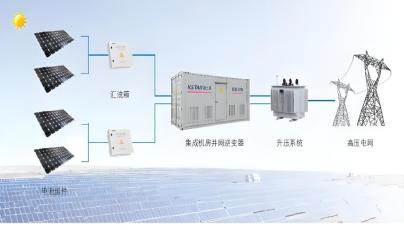Share to
The efficiency of
energy storage power lines (i.e. the efficiency from the high-voltage side of transformers to the energy storage grid connection point) refers to the ratio of the effective electrical energy that the system can retain to the total input electrical energy during the transmission of electrical energy from the high-voltage side of transformers to the energy storage system grid connection point. This efficiency is influenced by various factors, including transmission line losses, transformer conversion efficiency, and energy storage system charging and discharging efficiency. Therefore, improving this efficiency is crucial for enhancing the overall operational performance of the power system.
1、 To improve the efficiency of energy storage power lines, efforts can be made from the following aspects:
1. Optimizing power grid infrastructure:
It can shorten the length of transmission lines, reduce transmission distance, directly reduce line losses, and thus improve transmission efficiency.
Efficient transmission technologies can also be adopted, such as using high-voltage direct current (HVDC) technology, which typically has higher transmission efficiency than traditional alternating current transmission methods.
2. Improve transformer efficiency:
Use low loss and high-efficiency transformer equipment to reduce energy loss.
Reasonably adjust the transformer load rate to ensure that the transformer operates at its optimal load state, avoiding prolonged exposure to light or heavy loads, and reducing unnecessary energy consumption.
3. Optimize system design and operation:
Choosing efficient energy storage technologies, such as lithium iron phosphate batteries and other electrochemical energy storage methods, can usually provide high energy storage efficiency.
Optimize the design of energy storage systems to reduce the number of energy conversions and improve overall energy conversion efficiency.
Developing appropriate charging and discharging strategies can control the operation of energy storage systems, avoid overcharging and overdischarging, and reduce energy loss.
4. Strengthen system monitoring and maintenance:
Regularly inspect and monitor the status of the power grid and energy storage system, and promptly identify and repair potential faults and energy loss points. Improve the scheduling efficiency and operational flexibility of the system through intelligent control and optimization algorithms.

2、 Specific operational steps
1. Conduct a comprehensive evaluation of the existing power grid infrastructure, transformer performance, and energy storage system to identify efficiency bottlenecks.
2. Based on the evaluation results, develop specific improvement plans, including replacing efficient equipment, optimizing system layout, and adjusting operational strategies.
3. Gradually carry out improvement work according to the formulated plan, ensuring that all measures comply with safety and technical requirements.
4. After implementing improvements, continuously monitor the operational efficiency of the power grid and energy storage system to ensure that the improvement measures can achieve the expected results.
5. Based on monitoring results and actual operating conditions, continuously optimize the system to ensure efficient and stable operation.
3、 Significance of improving line efficiency
Improving the efficiency of energy storage power lines is of great significance for promoting energy transformation, facilitating the consumption of renewable energy, and enhancing the flexibility and economy of the power system. Specifically:
Reduce energy loss during transmission and energy storage processes, thereby improving energy utilization efficiency.
By optimizing the operation of power grid infrastructure and energy storage systems, the stability and reliability of the power system are enhanced, and the system stability is improved.
Effectively improving energy storage efficiency, better supporting the integration and consumption of renewable energy such as wind and solar energy, promoting the transformation of energy structure, and promoting the development of renewable energy.
By reducing energy loss and failure rates, it helps to lower the operating and maintenance costs of the power system.
Improving the efficiency of energy storage power lines is a complex and important task that requires multiple approaches and continuous optimization to achieve a more efficient and reliable power system.

